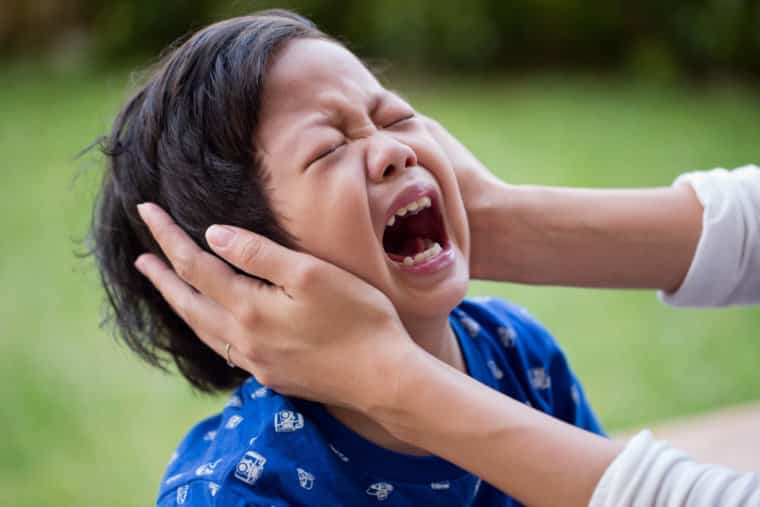When a child bursts into tears or a tantrum, his perspective on the world has shattered. His mind can no longer take in information—he can’t make sense of anything.
Hurt has flashed, big and hot, and his life feels broken. Every cry has its own particular feel, its own unique emotional tenor. We can’t know precisely what our children feel during their emotional moments, but it’s clear that these moments feel terrible.
The look on a frustrated, angry, sad or desperate child’s face tells us more than words will ever convey. The full out rage, terror or heartbreak in his voice is something most adults would never dare to publicly express, even in their worst moments, for fear that others would leave and never come back.
 In a way, a child who has burst into emotional flames is a brave child. He is banking on the love and understanding of his parents. Deep inside, he assumes, “They will come. They will be with me. They will try to understand. They will stand by me.”
In a way, a child who has burst into emotional flames is a brave child. He is banking on the love and understanding of his parents. Deep inside, he assumes, “They will come. They will be with me. They will try to understand. They will stand by me.”
For many, many all-out cries, children assume we’ll help. If we don’t offer caring, if we hurry them through, they eventually become people who can’t trust anyone with how they truly feel. They have to go underground with their emotional lives.
Listening, caring, taking time with a child whose world has, for the moment, shattered, is a powerfully bonding act. Because children’s emotional equilibrium is upset easily, we have the chance to “be there for them” daily while they are buffeted by emotional storms. Our finest hours as parents may actually be those moments when we get down on one knee right in the middle of the department store, say again, softly, “No, we’re not going to buy that today,” put our arms around our child, and let him grieve the loss of what feels like the one thing that will make his life happy.
After three decades of ever widening practice, we see that this act of listening and supporting a child through emotional storms, a tool Hand in Hand calls Staylistening, heals the hurt and brings children, cry by cry, toward emotional health and resilience.
Many deep, supported cries over what can’t be bought today at the store results in a teen who isn’t swayed by advertisements on TV, or bamboozled by the fashion trends of the day. Many deep, supported cries over not getting the biggest scoop of ice cream, or the red ball right now, results in grownups who can build teams using an ability to listen and an emotional “sixth sense” that comes only from having been cared about, again and again, when the emotional chips are down.
You are listener and guide
But what do you say to a child whose world has temporarily shattered? What wisdom can we impart at those moments when all seems utterly wrong? Our job at those moments is to be listener and guide. Our children need us to be open to the intensity and the power of the feelings they are having. They need us to fully hear how hard it is. They don’t need us to be frightened right along with them, or to jump in and be angry too. They need us to simply open our hearts to how hard it is for them.
 While we do that, they also need us to keep an eye on the actual situation, and to communicate a quiet, relaxed confidence that they are OK, that all will be well.
While we do that, they also need us to keep an eye on the actual situation, and to communicate a quiet, relaxed confidence that they are OK, that all will be well.
They can’t hold a good perspective while they scrub the upset from their systems with cleansing tears or tantrums. They need to devote all their energy to expelling the feelings that have engulfed them, so we are the keepers of the big picture.
And the big picture is what we can talk to them about, gently, simply, intermittently, while we listen to them and support their emotional recovery.
It’s important that we remind children of the basic things that are vital to their well-being.
“Your mommy is always coming back.”
“Daddy loves you so much.”
“You are a good girl through and through.”
“I won’t stop thinking about you, even though I have to go to work.”
“I know you’ll be safe with Sandy and Mike.”
“Your sister loves you. She doesn’t really want to make life hard for you.”
“Joey has the red ball. He won’t keep it forever. I’ll help you wait.”
“Maybe we’ll find your racing car, but even if we don’t, you can have a good time today.”
“I want your life to go well. But I do have to say, ‘No more ice cream.’”
“I know you don’t want to join in the play, but we’re here, and you can find a way to play. I know you can.”
“I’m sorry I yelled at you. That wasn’t good. I love you.”
“You do need to brush your teeth, even if it’s the hardest thing. But I’ll be with you.”
Perhaps more than anything else, our children need to hear, “I’ll be with you. I will stay with you. I won’t leave you alone while you feel this badly.”
We don’t need to sugar-coat reality for our children. Things break. Toys get lost. Friends move away. Parents go on trips. They can face and handle these losses, as long as someone listens and cares.
And as we pour listening and caring into them, our children use it to patch up the weak spots they sense that the world is a good place. That sense is theirs and theirs alone. Our main access to building their confidence is through play, respectful interactions, and listening when feelings are high.
How Love Wins Out Where Logic Can't Reach
Here’s a story that shows how guiding a child through a cry can bring about better day. The reassurance offered by a grandmother to her grandson isn't pie-in-the-sky. It is grounded in the truth that there’s not much, other than being together and caring about each other, that children really need:
 “My grandson told me early in the day, “I don’t want Greg to come over.” But his Mommy had arranged this play date as a favor to Greg’s dad, who had a special meeting to attend.
“My grandson told me early in the day, “I don’t want Greg to come over.” But his Mommy had arranged this play date as a favor to Greg’s dad, who had a special meeting to attend.
The boys were in the same class at school, but didn’t really click there. Who knows whether Greg was glad to come to my grandson’s that morning.
He wasn’t upset when his daddy left, but he wanted to play only solitary games, and my grandson responded by cooking up his own fantasy world. For an hour, I watched them play in the same room, but fail in their every attempt to communicate to one another. Any suggestion one of them had was rejected by the other. I did a little mediating, hoping to help them loosen the isolation they were holding tightly around themselves. I tried to get a little laughter game going between them. Nothing worked. Cooperation was dead on the floor.
They were enduring the time “together” as best they could. Then, something wonderful happened. Greg accidentally brushed against a big marble track construction my grandson had built with his Dad. It was grand, and down it went with a crash. My grandson went into full cry. “It’s gone! My marble track is gone! He smashed it!”
I pulled him onto my lap.
“He ruined it! It’s ruined! I’ll never be able to make it again!”
I listened for awhile, and Greg kept playing quietly ten feet away, acutely aware of everything my grandson was saying, but acting like he was just fine building his structure there.
As my grandson cried, I thought what to say. “It’s OK, you can make it again,” didn’t seem to ring true to the situation. He can’t make it all by himself yet. And who knows whether he or his Dad would remember exactly how it went. But was being able to make that exact structure again really necessary for a good life? Not really. So, best not to reassure in that direction. He didn’t need to be coddled. He just needed someone with him while he grieved.
“I know. You might not be able to ever make it again. But your life can still be good.”
“No, it can’t! I’ll never be able to have fun with the marble tracks again! Never!” he said, and followed up with hard crying.
“Well, I think you might have fun again. Maybe even this morning,” I said.
“No! He spoiled my tracks! I don’t want him here!”
He cried, kicked and struggled.
“Sweetie, I’m not going to let you talk that way about Greg. He didn’t mean to crash your structure. He didn’t want to hurt your feelings.”
“I don’t care, I don’t want him here!” He cried a bit more and attempted to fight against me a little.
I stay. He fights. I’m acting as the stand-in for Greg at this point – much better to get the bitterness out at me than at his school friend.
“Sweetie, he’s your friend. You are a good friend, and so is he. He’s here to play with you.”
The frustrated crying and kicking and thrashing continues. “But he crashed my track, and I’ll never ever, ever be able to make it again.”
“I know. You might not. Maybe never.”
He cries hard, wails. This is the pit of the feeling, I think. That life might never be sweet again. It’s a feeling that has to be faced in order to break its hold on his mind. The only antidote to feeling utterly defeated is to have someone quietly believe in you while they listen to you. Logic doesn’t touch this place but love and patience does.
After about twenty minutes of industrial-strength outrage, my grandson quieted down. Greg, who had been listening to everything, and, now and then, watching my grandson’s outburst, asked for some lunch.
I made them something to eat (picky eaters, both!), and then, the magic of a supported cry began to work. The boys, in their first successful cooperative act in three hours, decided to play hide and seek: I would seek, and they would hide, together. They jammed themselves into first one tiny place, then another and laughed as I found them.
The more they laughed, the better things went. Pretty soon, we had a small pillow fight going, and a bit of chasing. They kept figuring out how to play together, flex with one another, and laugh, until Greg’s dad came.
They both complained loudly that they didn’t want him to go!
A successful morning! The worst feelings about life had been faced. A cooperation stalemate had dissolved. Boys who were most comfortable playing alone played together. And a grandmother got to reach in and help.
It was the best of all worlds, cooked up on an ordinary day, with ordinary ingredients: mediocre interactions, an emotional spark, a lap, a gentle tone, some time, and just the right reassurance. Honest.
And trust that this child could right himself, given time and support.”
Patty Wipfler is the founder of Hand in Hand Parenting and the author of the book, Listen: Five Simple Tools to Meet Your Everyday Parenting Challenges. You can get more information on The Science of Staylistening here.

